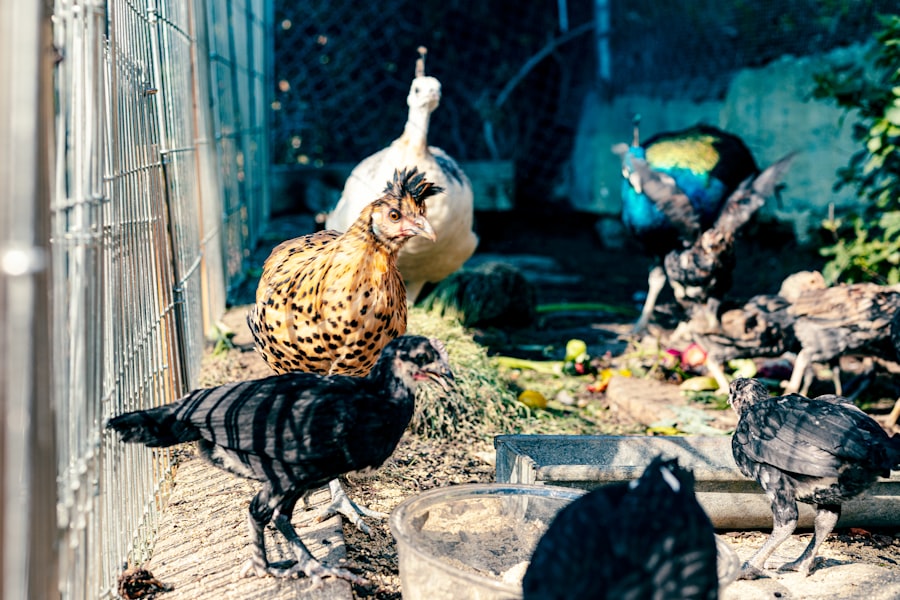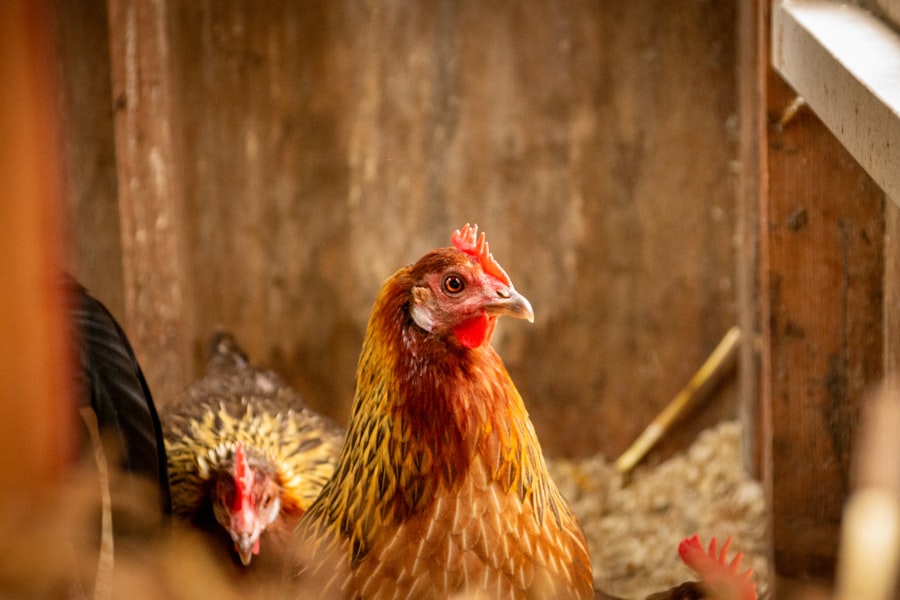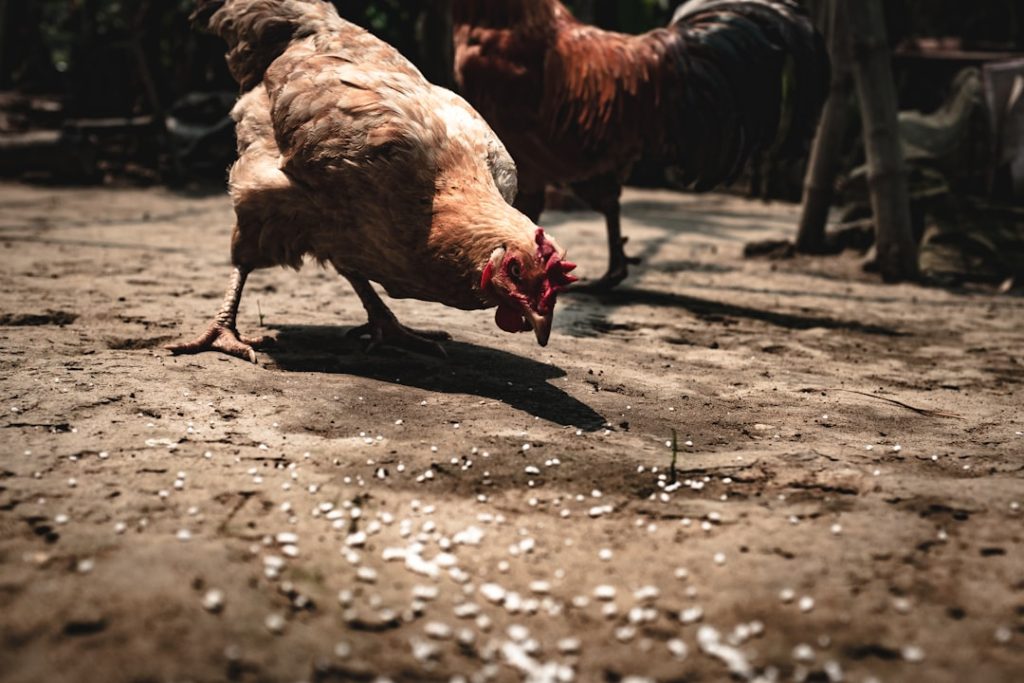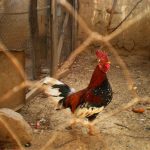Chickens possess a natural inclination to seek secure and comfortable nesting locations for egg-laying. This behavior is rooted in their instincts, driving them to find safe and quiet spaces. Understanding this tendency is essential when addressing the issue of chickens nesting in herb beds.
Chickens typically prefer dark, secluded areas for nesting, as these provide a sense of security and privacy. They are also attracted to areas with soft bedding materials like straw or wood shavings, which offer a comfortable environment for egg-laying. Chickens are creatures of habit and often return to the same nesting spot if it meets their comfort and security criteria.
Once a chicken establishes a nesting spot in a herb bed, it is likely to continue using that location unless deterred. This behavior makes it necessary to implement effective strategies to encourage chickens to lay eggs in more suitable areas. Chickens are known to be territorial animals and may become defensive of their chosen nesting spot.
This territorial behavior can lead to aggression towards other chickens or humans approaching their nesting area. Understanding this aspect of chicken behavior is crucial to prevent potential conflicts and ensure the safety of both chickens and those tending to the herb beds. By gaining insight into chicken behavior, it becomes possible to implement strategies that consider their natural instincts and tendencies, ultimately leading to a more harmonious coexistence between chickens and herb beds.
Table of Contents
- 1 Creating a comfortable nesting area
- 2 Providing alternative egg-laying spots
- 3 Using deterrents to discourage nesting in herbs
- 4 Regularly checking and removing eggs from herb beds
- 5 Maintaining a clean and tidy coop
- 6 Seeking professional advice if the problem persists
- 7 FAQs
- 7.1 What are the reasons chickens lay eggs in herbs?
- 7.2 How can I prevent chickens from laying in herbs?
- 7.3 What are some natural deterrents to keep chickens away from herbs?
- 7.4 Are there any herbs that chickens dislike?
- 7.5 How can I encourage chickens to lay in their nesting boxes instead of the herbs?
Key Takeaways
- Chickens have natural nesting instincts and prefer dark, secluded areas for laying eggs
- A comfortable nesting area should be quiet, dark, and lined with soft bedding material
- Providing alternative egg-laying spots such as fake eggs or secluded boxes can help redirect chickens from herb beds
- Using deterrents like wire mesh or motion-activated sprinklers can discourage chickens from nesting in herb beds
- Regularly checking and removing eggs from herb beds can help prevent chickens from returning to the same spot
- Keeping the coop clean and tidy is essential for maintaining a healthy and comfortable environment for chickens
- If the problem persists, seeking professional advice from a veterinarian or experienced chicken keeper is recommended
Creating a comfortable nesting area
Designated Nesting Boxes
One effective strategy for preventing chickens from nesting in herb beds is to provide them with a comfortable and secure nesting area within the coop. This can be achieved by setting up designated nesting boxes that are specifically designed to meet the needs and preferences of the chickens. These nesting boxes should be dark, quiet, and lined with soft bedding materials, such as straw or wood shavings, to create a cozy environment for laying eggs.
Maintenance and Hygiene
By providing chickens with a suitable nesting area within the coop, they are more likely to choose this spot over the herb beds for laying their eggs. In addition to creating a comfortable nesting area, it is important to ensure that the nesting boxes are kept clean and free of any debris or soiled bedding. Regular cleaning and maintenance of the nesting boxes will help to maintain a hygienic environment for the chickens and encourage them to use this designated space for laying eggs.
Preventing Overcrowding and Competition
Furthermore, providing ample space and enough nesting boxes for all the chickens in the coop can help to prevent overcrowding and competition for nesting spots, reducing the likelihood of chickens seeking out alternative locations such as herb beds. By creating a comfortable nesting area within the coop, chickens are more likely to choose this spot over herb beds for laying their eggs. This not only helps to protect the herb beds from damage caused by nesting chickens but also ensures that the eggs are laid in a clean and secure environment, making it easier for caretakers to collect and manage the eggs.
Providing alternative egg-laying spots

Another effective strategy for preventing chickens from nesting in herb beds is to provide them with alternative egg-laying spots that meet their preferences for comfort and security. This can be achieved by setting up additional nesting boxes or designated areas within the coop that are specifically designed to attract the chickens for egg-laying. These alternative spots should be dark, quiet, and lined with soft bedding materials, similar to the nesting boxes, to create a desirable environment for laying eggs.
In addition to providing alternative egg-laying spots within the coop, caretakers can also consider placing fake eggs or golf balls in these designated areas to encourage the chickens to use them for laying eggs. Chickens are known to be attracted to existing eggs when choosing a spot for laying their own eggs, so by placing fake eggs in the alternative spots, it can help to draw the chickens’ attention and encourage them to use these areas for egg-laying. Furthermore, providing ample space and ensuring that the alternative egg-laying spots are kept clean and well-maintained can help to make these areas more appealing to the chickens.
By offering suitable alternatives within the coop, caretakers can effectively redirect the chickens’ natural nesting instincts away from herb beds and towards designated areas that are more suitable for egg-laying.
Using deterrents to discourage nesting in herbs
In addition to providing alternative egg-laying spots within the coop, caretakers can also use deterrents to discourage chickens from nesting in herb beds. One effective deterrent is to use physical barriers such as wire mesh or fencing to block off access to the herb beds. By creating a barrier between the chickens and the herb beds, it prevents them from accessing these areas and reduces the likelihood of them choosing these spots for nesting.
Another effective deterrent is to use natural repellents such as strong-smelling herbs or spices that are known to be unappealing to chickens. For example, scattering dried mint or lavender around the perimeter of the herb beds can help to deter chickens from approaching these areas for nesting. Additionally, caretakers can also consider using motion-activated deterrents such as sprinklers or noise-making devices that startle the chickens when they approach the herb beds, further discouraging them from nesting in these areas.
By using deterrents to discourage nesting in herb beds, caretakers can effectively redirect the chickens’ natural instincts towards more suitable locations for egg-laying while also protecting the herb beds from potential damage caused by nesting chickens.
Regularly checking and removing eggs from herb beds
In order to prevent chickens from continuing to nest in herb beds, it is important for caretakers to regularly check and remove any eggs that may have been laid in these areas. By promptly removing any eggs found in the herb beds, it helps to discourage the chickens from returning to these spots for future egg-laying. Additionally, removing eggs from herb beds also helps to prevent them from being damaged or contaminated by environmental factors such as moisture or pests.
Regularly checking and removing eggs from herb beds also allows caretakers to monitor the extent of the issue and assess whether any additional measures may be needed to prevent chickens from nesting in these areas. By staying vigilant and proactive in managing the situation, caretakers can effectively address the problem of chickens nesting in herb beds and implement strategies to encourage them to use more suitable locations for egg-laying. Furthermore, regularly checking and removing eggs from herb beds helps to maintain a clean and hygienic environment within the garden or farm, ensuring that the herbs remain free from potential contamination or damage caused by nesting chickens.
By staying on top of egg removal, caretakers can effectively manage the issue and prevent it from escalating further.
Maintaining a clean and tidy coop

Creating a Comfortable Space for Egg-Laying
In addition to addressing the issue of chickens nesting in herb beds, it is essential for caretakers to maintain a clean and tidy coop environment. A clean coop provides a comfortable and hygienic space for the chickens, which helps to discourage them from seeking out alternative locations such as herb beds for nesting. Regular cleaning and maintenance of the coop, including removing soiled bedding, replenishing clean bedding materials, and ensuring proper ventilation, can help to create an environment that is more appealing for egg-laying.
Preventing Health Issues and Infestations
Furthermore, maintaining a clean and tidy coop also helps to prevent potential health issues among the chickens by reducing the risk of disease or infestations caused by unsanitary conditions. By prioritizing cleanliness and hygiene within the coop, caretakers can create an environment that is conducive to healthy egg-laying behaviors while also minimizing the likelihood of chickens seeking out alternative locations such as herb beds.
Promoting Overall Health and Well-being
By maintaining a clean and tidy coop environment, caretakers can effectively address the issue of chickens nesting in herb beds while also promoting overall health and well-being among the flock. This proactive approach not only helps to prevent potential damage to herb beds but also ensures that the chickens have a suitable and comfortable space for laying eggs.
Seeking professional advice if the problem persists
If despite implementing various strategies, the issue of chickens nesting in herb beds persists, it may be necessary for caretakers to seek professional advice from experienced poultry experts or animal behavior specialists. These professionals can provide valuable insights and recommendations tailored to the specific circumstances, helping caretakers identify underlying factors contributing to the issue and develop effective solutions. Professional advice may involve conducting a thorough assessment of the coop environment, nesting areas, and chicken behaviors to identify any potential triggers or stressors that may be influencing their choice of nesting locations.
Additionally, experts can offer guidance on implementing behavioral modification techniques or environmental modifications that can help redirect the chickens’ natural instincts towards more suitable egg-laying spots while addressing any underlying issues contributing to their behavior. Furthermore, seeking professional advice can also help caretakers gain a deeper understanding of chicken behavior and welfare, enabling them to make informed decisions and implement long-term strategies for managing egg-laying behaviors within the coop environment. By collaborating with professionals who specialize in poultry management and animal behavior, caretakers can access valuable support and expertise that can ultimately lead to a more sustainable resolution of the issue.
In conclusion, addressing the issue of chickens nesting in herb beds requires a comprehensive understanding of chicken behavior and instincts. By creating comfortable nesting areas within the coop, providing alternative egg-laying spots, using deterrents, regularly checking and removing eggs from herb beds, maintaining a clean coop environment, and seeking professional advice if needed, caretakers can effectively manage this issue while promoting healthy egg-laying behaviors among their flock. Through proactive management strategies and a commitment to understanding chicken behavior, caretakers can create a harmonious coexistence between their chickens and herb beds while ensuring optimal welfare for their flock.
If you’re looking for more tips on keeping chickens happy and healthy, check out this article on The Chicken Coop Country Diner. It offers great advice on creating a comfortable and inviting space for your feathered friends, including tips on feeding and keeping them entertained.
FAQs
What are the reasons chickens lay eggs in herbs?
Chickens may lay eggs in herbs if they feel stressed, threatened, or if they are seeking a secluded and comfortable spot to lay their eggs.
How can I prevent chickens from laying in herbs?
To prevent chickens from laying in herbs, you can provide them with a designated nesting area that is dark, quiet, and comfortable. You can also use barriers or fencing to block off access to the herb garden.
What are some natural deterrents to keep chickens away from herbs?
Some natural deterrents to keep chickens away from herbs include placing citrus peels, garlic, or strong-smelling herbs around the garden. You can also use physical barriers such as chicken wire or netting.
Are there any herbs that chickens dislike?
Chickens generally dislike strong-smelling herbs such as mint, lavender, and rosemary. Planting these herbs around the garden may help deter chickens from laying in the area.
How can I encourage chickens to lay in their nesting boxes instead of the herbs?
You can encourage chickens to lay in their nesting boxes by keeping the nesting area clean, providing comfortable bedding, and placing fake eggs or golf balls in the nesting boxes to mimic the presence of eggs. Additionally, ensuring that the nesting boxes are in a quiet and secluded area can also encourage chickens to lay there.
Meet Walter, the feathered-friend fanatic of Florida! Nestled in the sunshine state, Walter struts through life with his feathered companions, clucking his way to happiness. With a coop that’s fancier than a five-star hotel, he’s the Don Juan of the chicken world. When he’s not teaching his hens to do the cha-cha, you’ll find him in a heated debate with his prized rooster, Sir Clucks-a-Lot. Walter’s poultry passion is no yolk; he’s the sunny-side-up guy you never knew you needed in your flock of friends!







